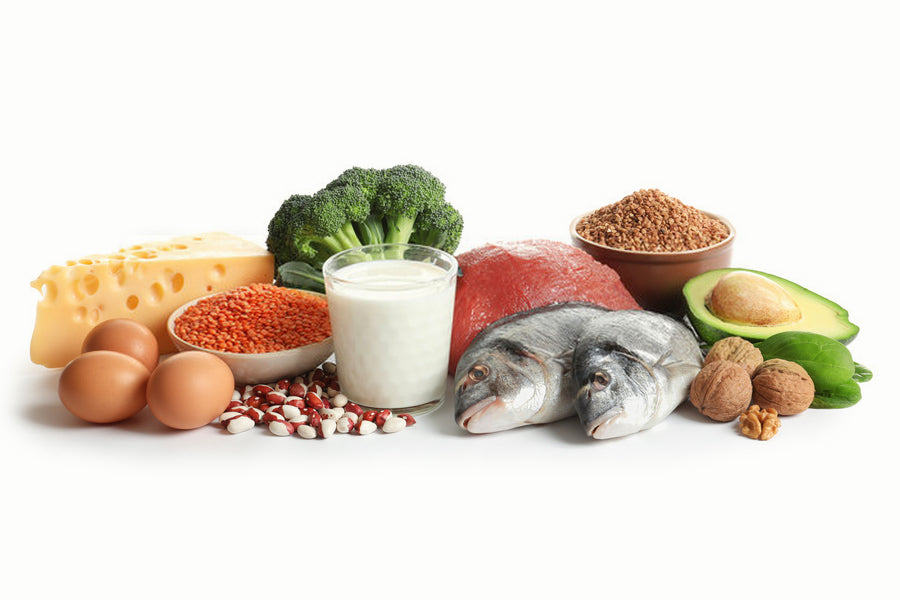Are you fed up with the odd-hour hunger pangs during your weight loss journey? The hunger pangs your stomach growls with can break all your motivation to control your appetite and follow a diet regime. If they continue for a prolonged period, they can entirely mess up your weight loss process.
However, you may control these hunger pangs by identifying the reason behind them and following tips that prevent you from binge-eating during your weight loss journey. This article will help you understand what causes hunger pangs, the symptoms of hunger pangs, and the ways to keep your hunger pangs at bay.
Before we move on to the causes and symptoms of hunger pangs, let's look at what hunger pangs are.
What Is Hunger Pangs?

When the muscle in your stomach contracts because of being empty, it results in hunger pangs. The hunger pangs signal your brain to release ghrelin, a hunger hormone that tells you to eat something.
When the fat levels in your body drop, the body sends the same signal to the brain; that is why you feel hungrier when you are on a controlled or reduced dietary intake.
You may experience lightheadedness, irritability, and dizziness due to uncontrollable hunger pangs.
To help overcome discomfort and irritability due to the continuous feeling of emptiness, you must know what normally causes these hunger pangs. Knowing what triggers the hunger pangs will help you manage them well and prevent you from eating unnecessarily,
What Causes Hunger Pangs?

You may experience hunger pangs because of several reasons, some of which are discussed below:
1. Quality of Food Eaten
Most of the time, hunger pangs happen when your body does not need food or calories. The changing insulin levels in the body could be one of the reasons for hunger pangs. The hormone ghrelin easily interacts with insulin, which is responsible for regulating blood sugar. When insulin levels fall, it causes ghrelin and hunger levels to rise.
Similarly, when you consume a higher amount of sugar and carbohydrates, your insulin levels are first increased, followed by a sudden drop. As a result, ghrelin increases despite you eating one or two hours ago.
Eating poor-quality food is one of the major reasons for frequent hunger pangs. Therefore, to save yourself from overeating and consuming extra calories, you must avoid foods that only fill you up for a while and do not provide the required nutrients to your body that makes you feel healthy and energized for a prolonged period.
2. Hunger Hormones
Hunger hormone is yet another major culprit behind you not being able to put up with your diet regime. When you are on a diet, your stomach is less filled, empty, or mostly in anticipation of the next meal. During such a situation, your brain releases a hormone known as ghrelin.
Ghrelin sends the signals to your body for releasing stomach acids that normally digest food. When you have not consumed food, these stomach acids begin to attack your stomach lining, which results in hunger pangs.
Research suggests that ghrelin can increase your hunger by about 30 percent.
3. Lack of Sleep
Sleep deprivation is among the major causes of excessive weight gain and binge-eating. Hunger pangs or hunger pains are linked to compromised sleep duration and patterns.
According to a research study, when you do not sleep well, your body releases a chemical that makes salty and high-fat food appealing to you. The study suggests that the sleep-deprived participants could not resist junk food even after consuming 90 percent of their daily calories.
4. Dehydration
Many people, especially those on a diet, cannot usually determine the difference between their bodies’ needs for food and water. A lot of times, hunger pangs are because of the reduced water intake. When your body is dehydrated, you may experience dizziness, lightheadedness, irritability, and stomach pain.
To avoid odd-time hunger pangs, you must ensure proper water intake. Besides, keeping yourself hydrated is even more essential when you are on a weight loss regime or following a high-intensity workout plan.
5. Your Environment
If you are suffering from a constant urge to eat despite consuming your fixed everyday calorie intake, it is time to focus on what and who you are surrounded with. Many people experience hunger pangs when they are surrounded by the smell and sight of their favorite foods.
Mouth-watering images of food or the aroma of a freshly baked cake may easily cause hunger pangs even after you have taken a proper meal.
6. Medicines and Your Medical Conditions
In some cases, hunger pangs may also be the result of certain medications or health conditions. For instance, most diabetes patients tend to feel hungrier as soon as their blood sugar level crashes.
However, hunger pangs may even indicate something serious, especially if followed by symptoms such as weakness, nausea, and vomiting. Medications such as antidepressants may also send hunger signals to your body by releasing the ghrelin hormone.
7. Your Emotional State
Sometimes people mistake other signals as hunger pangs. Many people tend to eat more when they are stressed out. For instance, many students share that they overeat a day or few days before exams. Stress eating is a common phenomenon in which people eat primarily because of their emotional state and not because of their body’s need for food.
According to research, stress and negative emotional conditions signal that your body immediately needs food, when in reality, it does not.
Now that you know some of the common causes behind hunger pangs, you should identify them to deal with them effectively.
Related Article: Weight Loss: Can You Achieve Your Goal with Exercise Only?
Symptoms of Hunger Pangs

Hunger pangs usually feel like a rumbling in your stomach. They may also appear as contractions or the feeling of emptiness. Some of the common symptoms of hunger pangs are:
- Increased cravings for specific foods
- Constant feeling of tiredness and lightheadedness
- Uncontrollable urge to eat
- Irritability
Once your body receives food, the hunger pangs, and these symptoms usually subside. However, dealing with hunger pangs can be even more challenging when you are on a controlled diet.
Dealing with hunger pangs is quite difficult when you are on a diet. Research suggests that specific neurons in the brain cause your appetite to increase after you have lost a certain amount of body weight. Researchers suggest that you can keep your hunger pangs at bay by manipulating these neurons.
Some of the effective ways to control the urge to eat are discussed in the next section.
How to Stop Hunger Pangs?

Some of the tips to help overcome hunger pains are:
1. Eat Healthily
As discussed before, your body’s insulin levels fluctuate when you consume sugar and simple carbohydrates, making you feel hungry. Therefore, you must eat healthy to avoid insulin dips. One of the best ways to avoid hunger pangs and excessive eating is to incorporate nutrient-dense foods in your diet, especially when you are on a diet.
It would be best to take a balanced meal consisting of lean protein, such as poultry, beans, lentils. Besides, eating fresh vegetables and fruits is also important to fulfill your body's nutrients requirements. You must also include whole grains, like oats, brown rice, and quinoa, in your diet, as these foods keep you full for longer.
You may also take healthy fats, especially those found in nuts and seeds. Incorporating low-dairy products into your diet is also recommended when you are on a diet.
Remember, you must limit your sugar, salt, and saturated fats, and trans fats intake. Moreover, you must consume only a limited quantity of refined carbohydrates like white bread and pasta.
2. Eat at Proper Intervals
To prevent your body’s hormone levels from getting triggered, you must stick to a proper food schedule. This way, the food will reach your stomach at a proper time to help it meet the stomach acid, which is released to respond to the increase in ghrelin hormone.
Besides, it is also important to divide your meal into quick meals instead of eating more at once. Try to eat a full meal only at a scheduled time, and avoid eating 2, 3 hours before sleeping so that your body has enough time to digest food.
3. Stay Hydrated
It is crucial to maintain a proper water intake to avoid eating at odd hours. It is recommended that you drink water throughout the day. You must make sure that you are not taking less than eight glasses of water daily. Moreover, it would help if you avoid caffeine and alcohol as they may trigger dehydration.
4. Ensure Proper Sleep
You may easily avoid mid-night cravings and other hunger pangs by following a proper sleep routine. It would be best if you sleep and wake up at the same time every day.
5. Distract Yourself

If you are sure that your hunger pangs are not due to the real need for food, the best way is to distract yourself. Some of the effective distractions are dancing, reading, working, and socializing.
Besides, when you are on a weight loss journey, exercising helps maintain body weight and prevents you from overeating as you would not want to work out on a full stomach. So exercising can be the best motivation to avoid eating due to hunger pangs.
Apart from the tips discussed above, another effective way to deal with hunger pangs is to take supplements specifically designed for this purpose. The role of supplements in minimizing the hunger pangs is discussed next.
Related Article: Here’s How Hydration Supplements Supercharge Your Summer Workouts
How Can Supplements Help Overcome the Hunger Pangs?

Some supplements, such as the DMoose fat burner pill, have been specifically designed to ensure healthy weight management. It does so by helping you burn more calories and by providing the exact nutrients to your body that will help it overcome hunger pangs and the urge to eat unnecessarily.
The belly fat burner pills contain ingredients such as 150 mg of caffeine anhydrous, a central nervous stimulant that increases fat metabolism and reduces painful hunger pangs, thereby facilitating weight loss.
Moreover, the body fat burner pills also contain 150 mg of raspberry ketone, known for improving fat metabolism. It helps promote weight loss, reduce the risk of diabetes, and increases satiety levels, thereby curbing severe hunger pains.
The fat-burning pills also contain 50 mg of Cissus Quadrangular, a tropical vine native to India, and other Asian countries, that specifically facilitate weight loss by suppressing your gnawing stomach pain caused by increasing appetite.
So buy fat burner pills to take your weight loss journey to the next level by increasing your fat metabolism and reducing your hunger pangs.
Takeaway
Hunger pangs are a common issue faced by the majority, especially by those on a diet regime. When the fat levels in the body drop, the body sends the signal to the brain by releasing a hormone that makes you feel hungrier and makes it difficult for you to curb your urge to eat.
However, there could be various reasons for these hunger pangs apart from your body’s actual need for food. Poor quality of food, reduced water intake, lack of sleep, hormones, your environment, and certain medicines can result in hunger pangs.
It is crucial to eat healthily, follow a proper eating and sleep schedule, keep yourself hydrated, and distract yourself by adopting healthy activities to avoid responding to hunger pangs by binge-eating,
Besides, supplements such as fat burner pills may also help you overcome hunger by increasing your satiety levels. At the same time, it may also help you reduce weight by increasing your fat metabolism.
Article Sources
- Betley, J. Nicholas, et al. “Neurons for Hunger and Thirst Transmit a Negative-Valence Teaching Signal.” Nature, vol. 521, no. 7551, May 2015, pp. 180–85. nature.com, https://doi.org/10.1038/nature14416.
- Frayn, Mallory, et al. “Emotional Eating and Weight Regulation: A Qualitative Study of Compensatory Behaviors and Concerns.” Journal of Eating Disorders, vol. 6, Sept. 2018, p. 23. PubMed Central, https://doi.org/10.1186/s40337-018-0210-6.
- Hanlon, Erin C., et al. “Sleep Restriction Enhances the Daily Rhythm of Circulating Levels of Endocannabinoid 2-Arachidonoylglycerol.” Sleep, vol. 39, no. 3, Mar. 2016, pp. 653–64. Silverchair, https://doi.org/10.5665/sleep.5546.
- Leidy, Heather J., and Wayne W. Campbell. “The Effect of Eating Frequency on Appetite Control and Food Intake: Brief Synopsis of Controlled Feeding Studies.” The Journal of Nutrition, vol. 141, no. 1, Jan. 2011, pp. 154–57. Silverchair, https://doi.org/10.3945/jn.109.114389.
- Mattes, Richard D. “Hunger and Thirst: Issues in Measurement and Prediction of Eating and Drinking.” Physiology & Behavior, vol. 100, no. 1, Apr. 2010, pp. 22–32. PubMed Central, https://doi.org/10.1016/j.physbeh.2009.12.026.
- Müller, T. D., et al. “Ghrelin.” Molecular Metabolism, vol. 4, no. 6, Mar. 2015, pp. 437–60. PubMed Central, https://doi.org/10.1016/j.molmet.2015.03.005.








